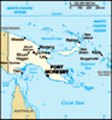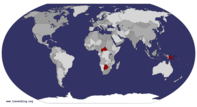Advertisement
Published: March 12th 2015
Our small missionary plane is landing. We can see a small village immersed in the greenery. It is Yaniruma. There is a real welter on the runway: people are going from all over the village and just in a couple of minutes all the native population is already here.
We are quite a novelty for the natives, just like they are for us. Some of them are examining our group with a wary curiosity, the others are turning away when see the lens of my camera. But they don’t show any open aggression. Our guide gives competent instructions and soon all our luggage, which is just a little less than 500 kilos, has been loaded on some backs or heads. The long caravan, resembling of an ant column, moves steadily to Simon’s house at the far end of the village. For a couple of days this ramshackle building will be our home.
Yaniruma village consists of several streets. Its population is about 500 people and composed of three nationalities: Kombai, Korowai Batu, Korowai. Korowai Batu build their huts very high, whereas for conventional Korowai seven meters is enough. The tribes speak different dialects, but, in principle, they all learned
to understand each other and live side by side, though conflicts still arise. Once we have happened to see it, but about it a while later...
There is only few municipal institutions in the village: a school (if you can call it that), an unfinished hospital with some basic medicines that looks like some kind of a store. All the houses were built by the government and look almost identical - they thrown together in haste from the rough coarse planks. There is no glass in the windows as well as electricity, running water, toilet facilities and gas. Diesel generators are only in a few houses - it is not cheap, only a few people can afford it. And it is so fun to watch satellite dishes near the huts, they are rusty and full of water - it is the only sign that the village embrace together with the other world the XXI century.
There are no any functional church or a bookstore or a newsstand -these people are not interested in the world news. However, Yaniruma residents learned about its existence only 30 years ago, when in 1977 the first family of missionaries came to
the village. The romantics from Holland dreamed to convert Papuans to Christianity, build the first school and the first so much-needed hospital. But the people (apparently, the parents of the current villagers) did not want to see strangers at their land. At a general gathering, it was decided to kill the whole family. And the natives did it not sparing even the children. The big missionary house stands as a gloomy reminder of this story, built as a sample of modern European buildings and evidently stands out among the other buildings.
The first tourists came to Yaniruma in the early 90's, and the enterprising natives settled them in the most infamous house. Soon, however, the visitors began to refuse sleeping there. Maybe, they saw the nightmares and the thought of a similar death gone them away from that place. We were decided to settle nearby the local people, so we set off to the representative of the village "power" - Simon. We had to use his hospitality for a few nights.
Simple, unfurnished house, no different from all the others, consisted of three small rooms: two walk-through rooms and a very small kitchen with a fireplace right
on the wooden floor.
"Facilities" in the form of modern toilets have been hammered together specially or us in the yard. A shower ... "Shower" was on the opposite street as a knee-deep river, however, in a week, as the result of heavy rains it turned into a full-flowing course of the Dayram river.
Despite of the asceticism of our temporary shelter, the life in the village was quite romantic. In the evenings we went swimming to the river, although we knew that there were huge crocodiles. Now, after my diving with the Nile reptiles in the Okavango, I have no longer feel fear near these monsters any more. People often afraid of what they don't know. We had dinner by candlelight, telling each other funny and sad stories of life. And we wondered how strangely our fates intertwined ... three of us met in hundreds of thousands of kilometers from civilization in the midst of swamps and jungles, in a distant world that knows no cars as well as TV, radio, mobile phone, Internet. A simple real-life communication brought us together and made clear to each other.
Here, on the edge of the universe,
silence was filled by the thoughts about the eternal and the stars shone especially bright. Nothing annoyed and on the contrary, every trifle brought please. Soon, we were used to the gang of kids who were always near and always follow us, even when we were just sitting at home. And the sleep on the hard floor with the sound of rain seemed particularly sweet.
At such moments, willy nilly you think whether the missionaries brought happiness to people inhabiting these places? After all, people continiue to live here as well as they lived here before, just wearing out someone else's clothes, loitering about and selling their unusual lifestyles to the tourists.
We studied the life of the villagers, and they studied our lives. At six o'clock in the evening it is getting dark, so the villagers go to bed early and get up with the first rays of the sun. At half past six in the morning our small house was filled with people. Some of them played homemade instruments, others smoked cigarettes without a break, while others incessantly argued about something. Periodically, this noise included in itself the yells of pigs that were under the
floorboards, endlessly weeping neighbor' kids and the eternally clapping doors. As there were no furniture in the house, guests placed directly on the floor, so did we.
Our guide Olfit cooked for us. He did it on a makeshift kitchen, right on the fire. Frankly speaking, we have never regretted about the decision to leave the cook. Moreover, our meal is always consisted of soup, rice, meat and vegetables. Generally we have never been hungry. I have always been touched by the cooking process. The whole crowd of men gathered at the "kitchen", half of them just sat on the floor, smoking and it seemed as they were discussing something important. As a rule, among my friends in Russia such gatherings in the kitchen are especially female activity.
Generally, there are a lot of men who loiter in the village, whereas women do not have to be bored. Many of them have more than three children, mainly the same age. Our neighbor, which lives next to us has five children. The youngest is no more than one year old and the oldest is about nine years old. Time to time, she went out somewhere taking only
a junior child with her, the other were locked alone in the house. I've never seen that the men helped their women. And I've never seen a woman bathed or washed their children. But there are rather a lot of sick kids.
The children play outside without any supervision. They have no toys, only that ones they can construct by themselves. Some have fun by smashing the pigs, which they call "Babi", others ride the logs on sticks, still others relentlessly follow the tourists or twine around the men. Older children attend school, which consists of only two rooms that are located in the rundown building.
Even in a total poverty the schoolchildren are required to wear a school uniform. And how do the girls in torn shirts and pants change when they put on red skirts and white blouses! Generally, if you see white clothes in these places it is like seeing a UFO. Villagers wash their things in a special way: either on themselves or taking out into the rain. Alas, even after a week, most people have mangy underwear hanging on the fence.
On the eve of the "X" day we sat at the
floor with a cup of tea for a total checking of duffels, equipment, food and the people. Olfit gathered a team of 12 strong men who are ready to go with us to the expedition. He recommended them as particularly good and strong men. After all, we'll have to travel in the wild, swampy and impassable tropical forests, where the way may have to be laid with a machete. Aborigines much more adapted to survive in these conditions, they were born here, grew up, know the terrain ... and the jungle is a place of their work as well. Most of them work part time for felling, which floated on the river to the nearest city.
We agree with the choice of Olfit, shake hands and pleased with good course of events go to sleep. Tomorrow we are waiting for the Great, long and difficult day. As we crossed to the other side of the river, we went into the forest and come face to face with all the difficulties and dangers of this region, our destinies will be fully entrusted to the hands of God.
Advertisement
Tot: 0.15s; Tpl: 0.019s; cc: 13; qc: 77; dbt: 0.0656s; 1; m:domysql w:travelblog (10.17.0.13); sld: 1;
; mem: 1.3mb


















D MJ Binkley
Dave and Merry Jo Binkley
Fantastic experience
We are really enjoying your trip. Love all the details. Thanks for sharing.